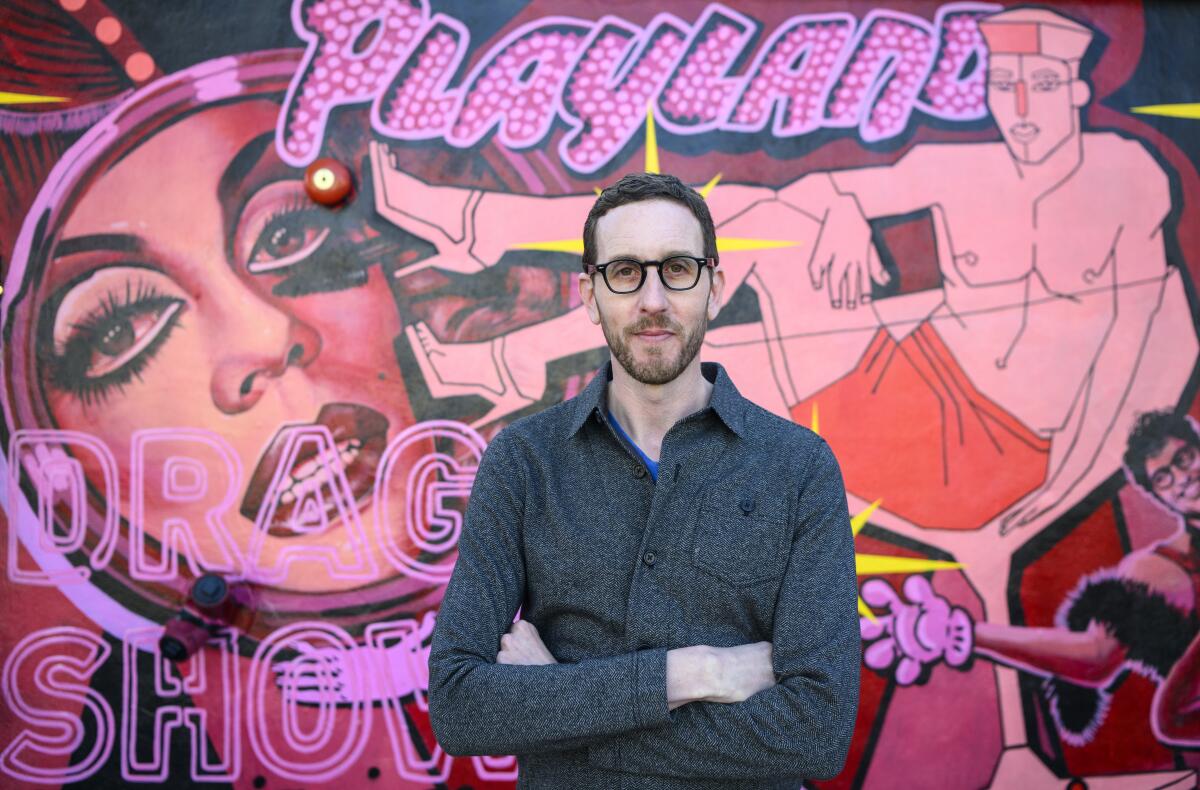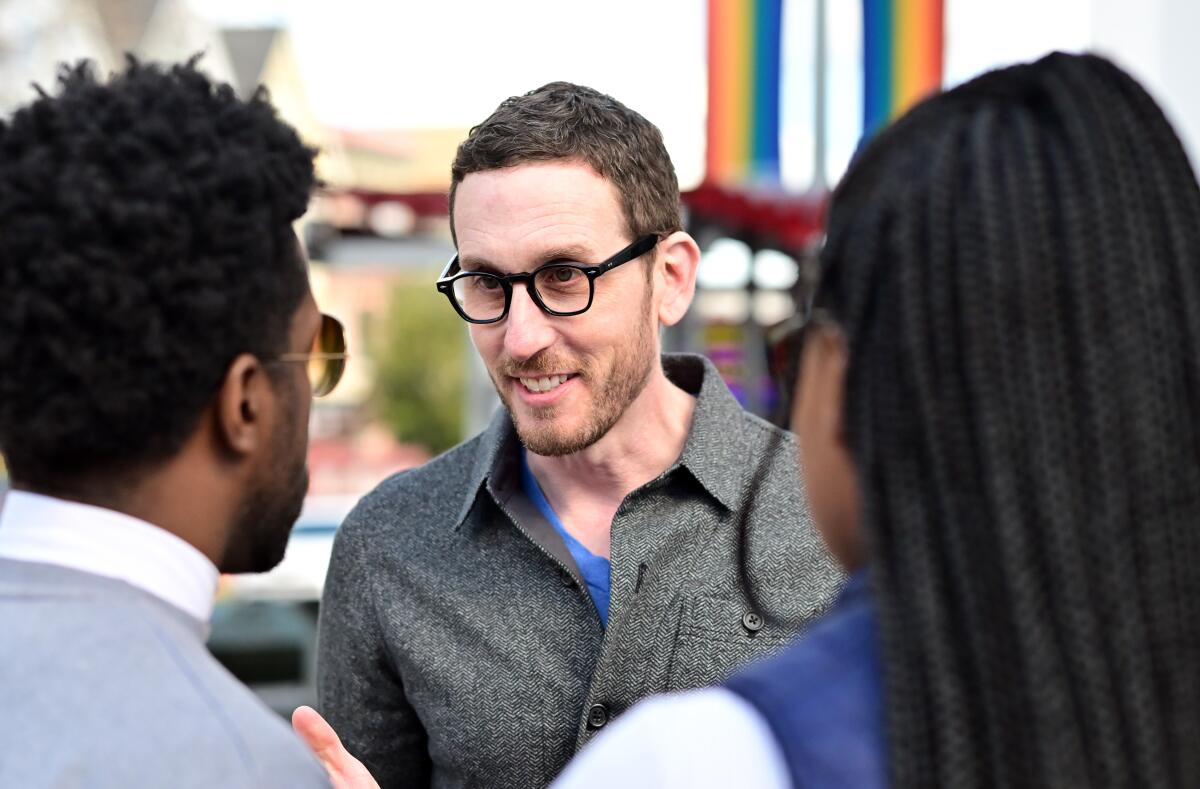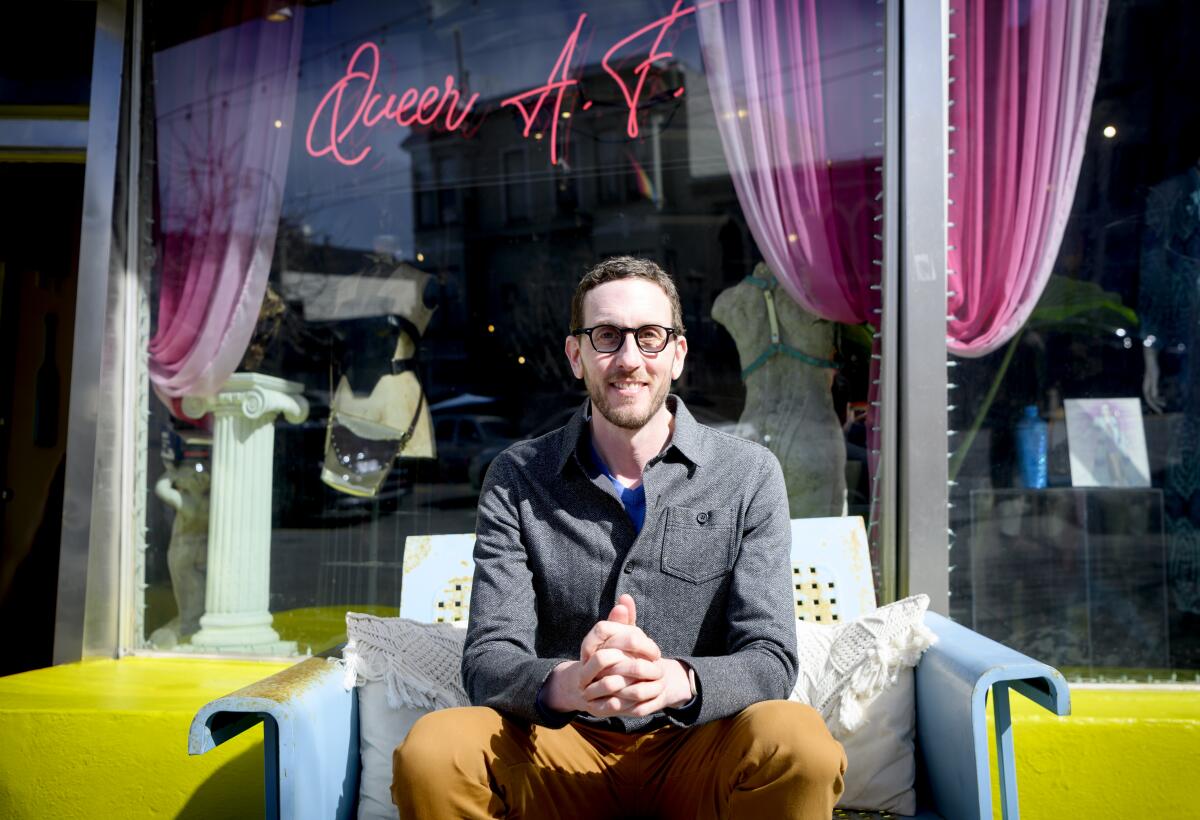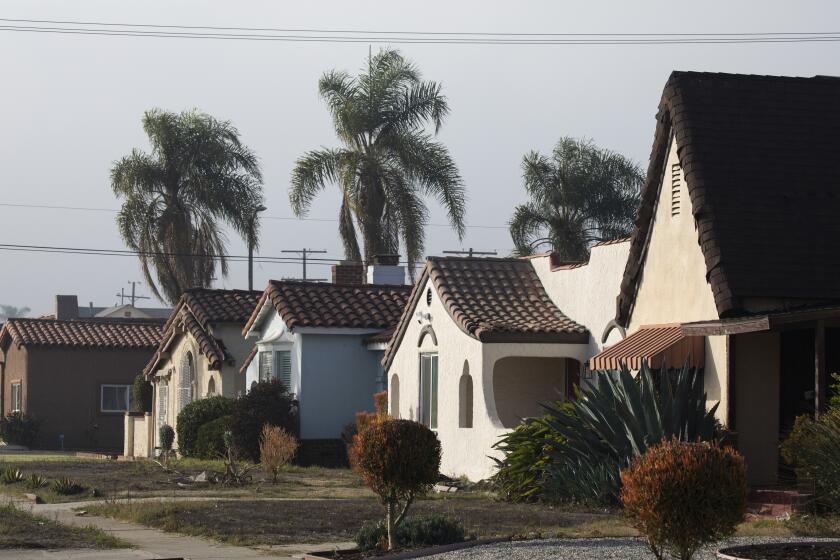Loved or hated, lawmaker Scott Wiener is a lightning rod who could make history

- Share via
Long before Scott Wiener became California’s leading housing iconoclast or a regular target for scathing Fox News diatribes, he was an introverted New Jersey teen with enviable choices for college.
Two options, Columbia University in New York and the University of Chicago, seemed tailor-made for Wiener, the kind of places where a studious closeted Jewish kid would blend in.
Instead, some inexplicable impulse — “the energetic forces of the world,” he surmised on a recent Sunday walking through the Castro, his longtime San Francisco neighborhood — drew him to Duke University in North Carolina, precisely because it wasn’t a natural fit.
“I realized I was meant to go to Duke because, I mean, it’s a good school, but it was also really social,” he explained. Somewhere in his subconscious, he wanted to force himself to be social too.
Consciously or not, Wiener is most comfortable seeking out the path of most resistance. His 13-year career in elected office can be viewed as a one-man experiment: How far can a politician go when he pushes all the boundaries at once?
The typical politician starting his career in local government would probably not take on reforming the city’s nudity law, particularly if his last name lends itself to cringeworthy puns. Or decide hours after barely winning a state Senate seat to take on a sacrosanct tenet of California housing policy in his first bill. Or, in the face of an onslaught of death threats, continue to spar online with right-wing combatants such as Rep. Marjorie Taylor Greene (R-Ga.) and Donald Trump Jr.
After an hour of debate, Herb Perez had had enough.
Now, he’s angling for a promotion to be the first openly gay person to represent San Francisco in Congress. But his path depends on former House Speaker Nancy Pelosi, who has yet to say if she will seek reelection.
Meanwhile, Wiener is simultaneously carrying another load of legislative heavy lifts that would, among other things, lay the groundwork for single-payer healthcare in California, extend his highly contentious law to streamline new housing developments and decriminalize “magic mushrooms” and most other psychedelics.
Wiener seems to gravitate to campaigns with a high degree of difficulty, even back in his days at Duke. The self-described introvert had joined a fraternity and was eyeing a bid to be its president. But first he decided to tell the other members he was gay.
“I had thought that coming out to the fraternity would end my chances of being elected president,” Wiener said.
He was wrong. Several months later, Wiener won.
The archetype of the retail politician is of an outgoing back-slapper, someone who can glide frictionlessly among crowds and always fit in.
Wiener is not that. He speaks in a deep monotone that can verge on a drone. He is personable but not particularly gregarious. And at 6’7”, he always sticks out.
Yet Wiener, 52, has mastered his own style of retail politics that relies less on natural charisma and more on sheer ubiquity.
Even in the settings where he seems most incongruous — at an iconic gay bar wearing a button-down and khakis in a crowd of bar-goers wearing leather fetish gear, for example — he is constantly recognized and greeted warmly.

In the Castro, he is stopped roughly every five minutes for a quick hello or a longer exchange about a bill he wrote or the frustrations of business owners over the city’s homelessness crisis. At a Lunar New Year celebration in Chinatown, the time he spends circulating the banquet hall shaking hands lasts longer than his official remarks. When his schedule is free of hard commitments, he’ll find more community events to attend to fill the time.
Wiener moved to San Francisco in 1997, soon after graduating from Harvard Law School, assuming he’d eventually move back to the Philadelphia area, where his parents still live. He’s stayed since, doing stints in private practice and in the city attorney’s office and building a network through Democratic party and LGBTQ+ activism.
He ran for the San Francisco Board of Supervisors in 2010, although he began knocking on doors in the district at least a year and a half early. His favorite time to go door-to-door, according to friends, was in the pouring rain, since he knew his willingness to brave the elements would stick in residents’ minds.
His first brush with national attention was for his clash with the Naked Guys, a small but dedicated group of public nudists in the Castro. At first, he simply proposed requiring someone to place a towel or some other barrier under their naked behind while they sat at a restaurant or a public bench. Later, he pushed to tighten nudity laws altogether, though, he’ll note, the rules are still among the nation’s most permissive.
Of all the issues he’s tackled in his career, it’s the one he remembers least fondly. The nudists held a grudge, heckling him at public appearances for years afterward. Still, he’s reminded of that chapter whenever he’s in his Sacramento office, where a framed “Butt Guardian” flyer from the local alternative weekly hangs on the wall.
The nudity bill sparked a kind of spectacle that could singularly define a career, but in Wiener’s case, it has been quickly subsumed by the avalanche of headline-grabbing proposals he has championed over the years.
For many, Wiener is best-known for his work on housing. A patron saint of the YIMBY (“Yes In My Backyard”) movement to maximize building housing, his first bill after being elected to the state Senate in 2016 focused on streamlining new development by wresting away some power from local governments.
Wiener’s subsequent big swings to spur more development brought him national attention — and a swell of pushback. Local governments chafe at losing control over planning. Homeowners oppose any new development that would change the character of their neighborhoods. Tenants’ rights and equity groups fear that gentrification will lead to displacement of low-income residents. The powerful construction workers union, a onetime ally, now accuses Wiener of undercutting pay and labor standards. And groups such as the AIDS Healthcare Foundation, run by Wiener’s longtime political foe Michael Weinstein, have cast him as a shill for the real estate groups that have funded his campaigns.
Wiener shrugs off such critiques, noting he supports rent control and has sponsored bills aimed to boost affordable housing. And while some of his buzziest bills failed to pass, they succeeded in reshaping the housing debate in Sacramento.
“Scott was the first to call the question on these big topics,” said San Francisco City Atty. David Chiu, who similarly championed housing in his tenure in the state Assembly. “For anything that significant in politics, you need that person who is the first, who lays it out, makes the case, and sees where it goes.”
California lawmakers are considering bills to address the housing shortage that’s increased costs of living and worsened homelessness in the state.
Simultaneously, Wiener emerged as the go-to lawmaker to carry some of the most difficult legislation for LGBTQ+ rights. One measure eliminated laws that criminalized knowingly transmitting HIV, which imposed harsher penalties than similar laws for other serious communicable diseases.
Another gave judges discretion on whether certain people engaging in consensual anal or oral sex with a minor age 14 or older must register as sex offender. State law already allowed such discretion in cases of consensual penile-vaginal sex.
Wiener said the bill’s purpose would simply ensure that LGBTQ+ teenagers and young adults were treated equally as their straight counterparts. But few public figures would relish their names to be anywhere near the phrase “sex offender registry,” and Wiener’s colleagues openly grappled with the political ramifications of voting for such a bill, particularly in a time when “groomer” has become a popular epithet on the far-right.
“Everyone wants the ‘mom and apple pie’ bill and to be flying gay flags in parades,” said Assemblyman Rick Chavez Zbur (D-Los Angeles) the former head of the advocacy group Equality California. “When you get to the really hard social justice bills, many legislators walk away from those. Sen. Wiener never does that.”
Meanwhile, he has waded into nearly every other policy area that attracts attention in Sacramento. His abridged list of successes includes laws to require health insurers to cover mental healthcare at parity with physical health; repeal loitering laws regarding prostitution; enshrine state net neutrality standards and increase access to HIV-prevention medications.
His bills that have come up short include those that would have enabled safe injection sites for supervised drug consumption; allowed cities to keep bars open until 4 a.m.; required large corporations to disclose their greenhouse gas emissions; and decriminalized psychedelics. (He’s reintroduced versions of the latter two this year.)
“Sen. Wiener is one of those folks that a lot of people hate and also a lot of people really like,” said Mahdi Manji, an advocate for low-income housing with the Inner City Law Center in Los Angeles. “And sometimes it’s the same people, just because he’s taken strong positions on so many issues.”
The work is so all-consuming that some allies worry that Wiener, who is not married, has let his job supersede his social life. Still, he has a tight-knit circle of friends who describe him as loyal and slyly funny, a fantasy novel aficionado and Kylie Minogue super fan.
“A lot of times I read stuff about him and it makes him seem like a robot,” said Adam Cohn, a friend since law school. “He does let his hair down. He can be a lot of fun.”
In Sacramento, there’s a phenomenon known as “Wiener fatigue.” Its main symptom is a reflexive sigh of exasperation every time the senator introduces another bill that will invariably cause political headaches, accompanied usually with begrudging respect for his relentless lobbying for the measure.
Even Wiener knows he can come across as irritating — “in a loving way!” he insists— every time he asks a colleague for a vote that may not play well in places less liberal than San Francisco (i.e. almost everywhere else in the state), and he makes a point to express admiration for those who take on those political risks.
“You’re asking your colleagues for a lot,” he said, copping to sometimes taking on too many tough bills. “Guilty as charged.”
The everything everywhere all-at-once approach to politics invariably means some constituency (or several) will be battling Wiener at any given point. But he seems unfazed by conflict after surviving the gantlet of local San Francisco politics, famously described as akin to “a knife fight in a phone booth” — a vicious battle between various shades of blue.
In Sacramento, he is among the furthest left members in a Democrat-dominated legislature. But by San Francisco standards, Wiener is a moderate. His alliances with Big Tech and real estate interests make him suspect among economic progressives, who accuse him of backing “trickle-down housing” and other policies that have perpetuated the city’s stark divide between the rich and poor.
Tom Ammiano, a longtime progressive politician and contemporary of gay rights icon Harvey Milk, said Wiener embodies the new generation of Democrats who have put less emphasis on class issues.
“We’re not seeing AOC [Rep. Alexandria Ocasio-Cortez]. We’re seeing Scott Wiener,” Ammiano said, adding he is frustrated almost in a parental way at the current ascendance of the moderate wing.
“I want to be supportive, I want to be protective, and then at the same time, I’m really pissed,” Ammiano said.
Wiener credits San Francisco’s bare-knuckled political world with toughening his hide and teaching him not to hold grudges. Sal Rosselli, president of the National Union of Healthcare Workers, said Wiener has become his go-to for tough healthcare bills, even though his union strongly backed his opponent Jane Kim in 2016.
“He’s never held it against us,” Rosselli said. “It’s more the norm in politics that people are resentful, they retaliate or they dismiss you. One of Scott’s virtues, from my perspective, is he’s the opposite.”
Others say Wiener is more thin-skinned than he admits. Kim Tavaglione, who leads the San Francisco Labor Council, recalled meeting with Wiener shortly after he won his supervisor’s race, despite many labor unions running a campaign against him.
“One of the first things I had to do was go to a meeting with him where he let us know how angry he was...I basically got chewed out for 20 or 30 minutes,” she said, adding that, in her view, he hasn’t changed much since.
The standard-issue hardball politics among Democrats is one thing. But a few years ago, Wiener began facing backlash of a different, more menacing variety.
His bill to change the sex offender registry became fodder for believers of QAnon, an amorphous conspiracy that stoked unfounded accusations that Democrats were sexually grooming and trafficking children. By fall of 2020, he was at the center of a maelstrom. Texas Republican Sen. Ted Cruz tweeted that “Today’s CA Dems believe we need more adults having sex with children,” while Donald Trump Jr. wrote the bill would “normalize” pedophilia. Within three months, he received several thousand death threats.
Since then, Wiener has been become a regular target for right-wing firebrands such as Greene, who called him a “communist groomer,” and Tucker Carlson bashed a number of Wiener’s bills on his now-canceled Fox News program.
“Would you trust this guy within 500 yards of a child?” Carlson said in one segment, while onscreen flashed a photo of Wiener at the Folsom Street Fair, San Francisco’s famous leather festival. “Probably not.”

In public and on social media, Wiener is defiant. He also speaks publicly about the threats on his life and how his home was searched for bombs twice last year.
But he admits he has been rattled. When Paul Pelosi, husband of the then-House Speaker, was attacked in his home by a conspiracy theorist who was looking for his wife, the reality of this dangerous moment suddenly felt more real.
“I’ll tell you, after that happened, there were times when I would wake up in the middle of the night...if I’d hear something at my door. Which had never happened before,” Wiener said
The vitriol from the far right has some political upside in San Francisco. Wiener has sent out fundraising missives around Carlson’s attacks and his vocal defense of transgender people has helped heal some — though not all — rifts that Wiener has with San Francisco progressives, especially LGBTQ+ voters.
“There’s not going to be a big schism in the community. I think Scott is going to do very well in this race,” said Bevan Dufty, a progressive and former supervisor. He quickly amended his statement to add “at the time when the Speaker Emerita is no longer pursuing election.”
Those caveats abound when talking about Wiener’s next move. Last month, he formed an exploratory committee to raise money for a congressional run, emphasizing he would only do so if Pelosi decides to step down.
Allies cast the preparations as a practical matter. If Pelosi announced her decision later this year, there would little time to build a campaign for the primary election in March. He especially does not want to be flat-footed on fundraising given rumors that Pelosi’s daughter Christine might run to succeed her mother and tap into the former Speaker’s expansive donor network. (Christine Pelosi did not respond to a text message seeking comment.)
The move struck some as a distasteful attempt to push Pelosi toward the door.
“All these other old white guys get to stick around as long as they want before people start planting stories,” said Rudy Gonzalez, the secretary-treasurer of the San Francisco Building Trades union. “Somehow the standard is different for Nancy Pelosi.”
The observation was a pointed reminder of another challenge facing Wiener: following in the footsteps of a San Francisco icon.
Yet again, Wiener is choosing the toughest possible path.











